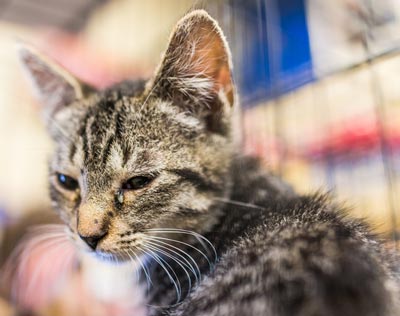Eye Infections in Young Kittens

At around two weeks of age, when a new kitten's eyes first open, it's common for them to show signs of an eye infection. Though it's common, it isn't normal and must be addressed.
Causes and Signs of Eye Infections in Kittens
The two most common causes of eye infections in new kittens are vaginal infections in the mother cat that were transferred to the kitten's eyes during birth and dirty environmental conditions present after birth.
Staphylococcus and Streptococcus bacteria species cause eye infections in newborn kittens the most often, but Herpesvirus is also fairly common. The signs that occur include:
- Redness and swelling of the conjunctiva, or the soft tissues inside the eyelids.
- Discharge from the eyes that can be clear, white, yellow, or green.
- Crustiness building up on the skin around the eyes.
- Eyes that are "glued" shut with discharge.
In severe cases, eye infections can cause corneal ulcers in kittens, which are sores on the outer surface of the eyeball. Kittens can go blind if eye infections are left untreated. In other cases, permanent damage may be done to the conjunctiva or other eye structures.
Treatment of Eye Infections in Kittens
If your kitten is showing the signs listed in the section above, visit the veterinarian right away. The doctor will do a complete physical exam and check the eyes for corneal ulcers. A culture of the eye discharge or vaginal discharge in the mother cat might be sent to the lab.
If the kitten's eyes are crusted shut, the veterinarian will use warm water compresses to loosen the debris gently and get them open, and then saline or warm water can be used to wash the eyes. The veterinarian will show you how to do this, and you may need to repeat it periodically at home during the early stages of treatment.
Your kitten will need to have an eye drop or ointment applied every few hours, probably one containing antibiotic. The veterinary staff will show you how to put the medicine in, so make sure you ask any questions you may have. An oral antibiotic may also be prescribed if the veterinarian feels that the kitten has an upper respiratory infection in addition to the eye infection. The veterinarian may wish to recheck the kitten in a few days to verify that the treatment is working.
Your veterinarian may recommend that you change the kitten's bedding daily, and if there are unaffected kittens in the litter, you may be directed to gently wash the mother's nipples with warm water and dry them well periodically to attempt to decrease the illnesses' spread between kittens.
You May Also Like These Articles:
How To Administer Medication to Your Cat
How To Know When Your Cat Is Sick
Why Do Some Cats Have Two Different Colored Eyes?
Why Do Cats Do the Slow Eye Blink? : It's a Kitty "Eye Love You"!



